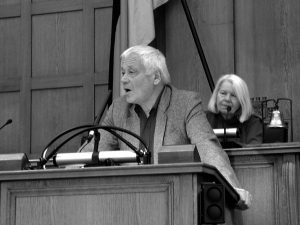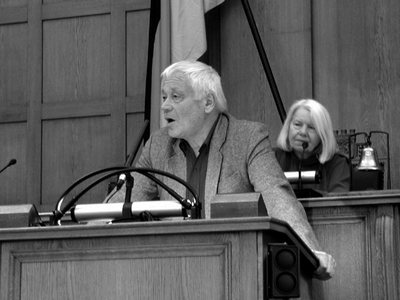
Bernhard Graefrath (1928-2006) was an international law scholar and diplomat for the German Democratic Republic (GDR). A specialist in human rights and international humanitarian law, Graefrath published on a wide range of topics and represented the GDR at the United Nations. During the Second World War, Graefrath worked as a Flakhelfer (auxiliary youth member) in the Luftwaffe, before joining the Socialist Unity Party (SED) in 1946, at the age of 18. After studying to become a People’s Judge in the immediate postwar period, he graduated in law at the Humboldt University in East Berlin in 1951 and began work there as a lecturer. At the Babelsberg Conference in 1958, Graefrath was temporarily purged from the legal profession, along with many other legal scholars deemed to be ideologically revisionist due to their (ostensible) lack of deference to the centralized power of the SED. After two years as mayor of the town of Zossen, south of Berlin, to which he was assigned as a form of re-education, he was allowed to return to the law. By 1963, he had written his Habilitation (a second major project after the dissertation, which acts as a prerequisite for a professorship) and was promoted to the position of Professor of International Law at Humboldt.
In the 1960s, Graefrath became an important expert in international law for the GDR. He joined the GDR Committee for Human Rights where, alongside Hermann Klenner, he became one of the organization’s key theorists. When East Germany joined the United Nations in 1973, he became part of the diplomatic delegation representing the GDR in matters of international law. This included acting as the expert for East Germany during the negotiations over the Additional Protocols to the Geneva Conventions from 1974 until the final agreement in 1977. He then shifted positions to the Human Rights Committee, where he was often in the position of defending the human rights record of the GDR and the Socialist Bloc against the critiques of Western delegations. From 1986 onwards, he also served on the International Law Commission at the UN.
In his academic writings, Graefrath established himself as an expert across a wide range of topics. As a leading member of the GDR League for the United Nations, Graefrath published a volume in 1956 entitled The United Nations and Human Rights – the first major book on the subject in the GDR – in which he sought to connect anti-colonial human rights ideas emerging from Bandung and the non-aligned movement to the mission of the UN. In 1968, he took up the problem of statutory limitations for war crimes in West Germany, in particular in connection to the socialist international legal convention on the matter. In the 1970s, he wrote extensively about the problem of humanitarian law, concentrating on the ongoing exclusion of anti-colonial wars from international protections. In his writings on international law, he consistently argued for its importance as a tool of socialist diplomacy and its necessity as part of global peaceful coexistence.
After the collapse of the GDR, Graefrath went into early retirement in 1992 from his position as professor at the Institute for the Theory of the State and Law. From retirement, Graefrath continued to comment on issues of international law, in particular the problems of the International Criminal Court and the consequences of the first Gulf War. He was also politically active in the campaigns against the NATO intervention in Kosovo and economic sanctions in Iraq.
Ned Richardson-Little (University of Erfurt)
Bibliography
-
Bernhard Graefrath, Die Vereinten Nationen und die Menschenrechte. Deutscher Zentralverlag, 1956
-
Bernhard Graefrath, E. Oeser & P. A. Steiniger. Völkerrechtler Verantwortlichkeit der Staaten. Staatsverlag der Deutschen Demokratischen Republik, 1977
-
Bernhard Graefrath, Probleme des Völkerrechts. Akademie Verlag, 1985
-
Bernhard Graefrath, Menschenrechte und internationaler Kooperation. Akademie Verlag, 1988


